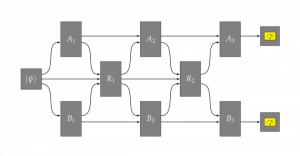Summary
Classical game theory – conducted at the interface between economics and computer science – has found applications in topics ranging from networking and security to online markets. Despite over 20 years of research into connections between game theory and quantum information, we have yet to see any significant implications of quantum information when applied to game theory. This project brings a reformulation of quantum game theory as a mathematical theory of strategic interactions involving quantum information among rational decision-making agents. We focus on computational complexity aspects as a means to redevelop quantum game theory and tackle four challenge areas that include non-interactive games, interactive games, correlated (and entangled) equilibria, and cooperative quantum strategies. This reformulation of quantum game theory holds promise for enabling new mathematical techniques in quantum information science (e.g., communication protocols) and new applications of quantum devices. Finally, as we consider the fundamental aspects of quantum games, we are bound to discover interesting new mathematical structures that may find uses in other areas of quantum information science.

Figure 1. An illustration of a multiple-turn, abstract game involving three agents who exchange and process quantum information.
Related Content

On-Chip Microwave-Optical Quantum Interface
Summary In this project we develop a quantum interface between microwave and optical photons as a key enabling technology of a hybrid quantum network. In such a network, the robust optical photons carry quantum information through optical fibres over long distances, while superconducting microwave circuits protected from thermal photon noise by the low temperature […]
October 29, 2018

Ultrafast Dynamical Studies of Valley-Based Qubits
Summary As monolayers, transition metal dichalcogenides (TMDCs) – such as tungsten diselenide (WSe2) – become direct-bandgap semiconductors capable of emitting light. Compared to conventional direct-bandgap semiconductors, such as III-V semiconductors like GaAs, excitons (quasiparticles made of an electron hole bound with an electron) and single-layer TMDCs (SL-TMDCs) have much stronger binding energy. Excitons and […]
June 29, 2018

Magnetoelectric Coupling in New Composite Multiferroic Nanostructures as High-Density Quantum Multistate Memory Elements
Summary Magnetoelectric multiferroics are materials that exhibit correlated ferroelectric and ferromagnetic properties (i.e., a magnetoelectric effect). The resulting ability of these materials to simultaneously store data in electric polarization and magnetic moment could increase data storage density and data processing speed while reducing energy consumption. This project aims to design and fabricate new composite multiferroic […]
February 1, 2023


